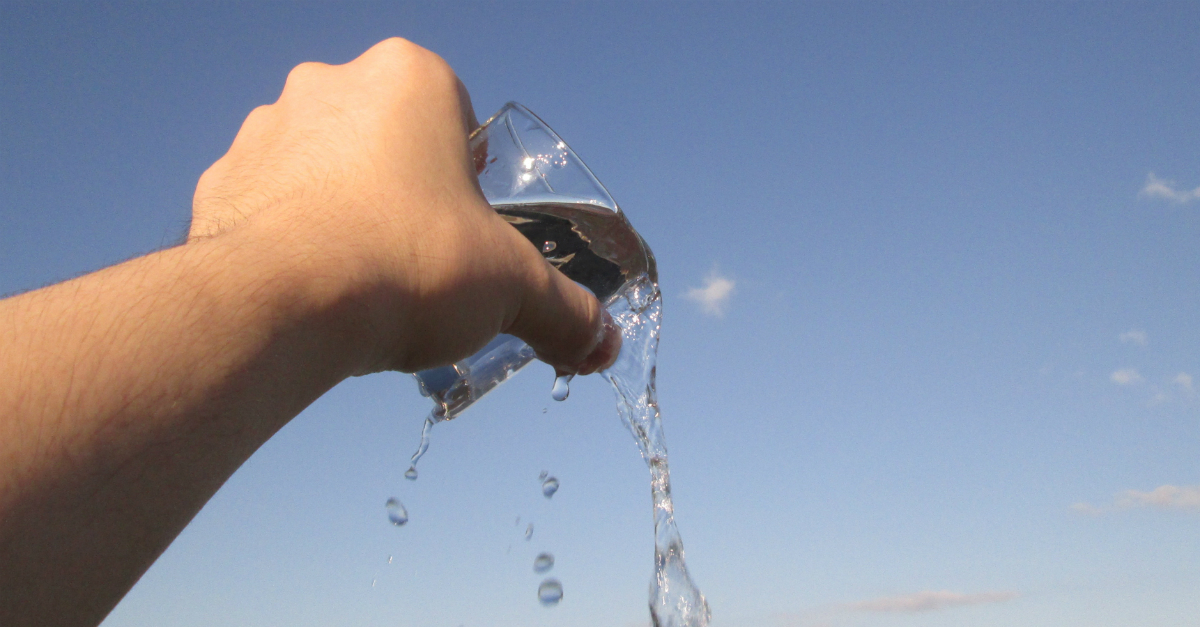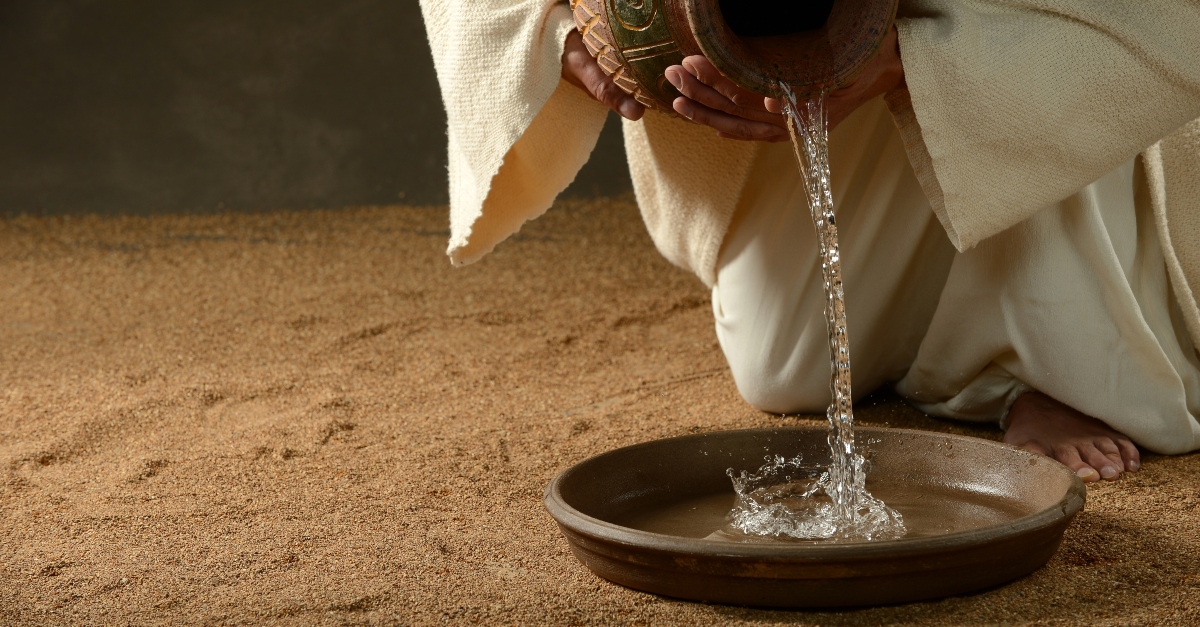
Later, knowing that everything had now been finished, and so that Scripture would be fulfilled, Jesus said, “I am thirsty.” – John 19:28
From the beginning God is love. We exist because of his love. We have relationship with God because of his mercy. Through Christ, we see the promise of redemption and reconciliation fulfilled.
And though the events leading to the crucifixion of our perfect Savior are unthinkably violent and painful, Jesus’ words in John 19:28 are precious confirmation: that the events he foreknew (and the prophets foretold) secured victory over death by the blood of God’s son.
What any of us would have done to satisfy Jesus’ thirst on that day! But as Jesus was known to repeat, “I tell you the truth,” this final statement, “I thirst,” on the cross is Jesus’ culminating deliverance over the threshold of death. He then declares his work finished.
He completes the work He began to satisfy our longings for life beyond death. To quench souls thirsting for living water.
Photo Credit: © Getty Images

What Does ‘I Thirst’ in John 19:28 Mean?
Outside of the physical truth that Jesus was horribly depleted as he agonized on the cross, his “I thirst” statement signifies divine completion. He is proclaiming this thirst in powerful obedience to fulfill prophecy, such as Psalm 22 where David cries out “why have you forsaken me?” and Psalm 69 which details the events of his passion.
Jesus knew the word of God was perfectly measured to correlate with, and prepare for, his imminent crucifixion. In the book of John, as Jesus proclaims his thirst, he expresses his readiness for the sacrifice required to do the work of his Father.
We’re reminded of his certainty when he promises the woman at the well:
“…whoever drinks the water I give him will never thirst. Indeed, the water I give him will become in him a fount of water springing up to eternal life.” (John 4:13-14)
In this same passage, he comforts his disciples who worry about his welfare. He assures them he also has food to eat that they know nothing about:
“My food is to do the will of Him who sent Me and to finish His work.” (John 4:34)
In proclaiming “I thirst,” Jesus draws singular, final focus on the attentiveness of God to supply all that He promises.
What Is the Context of John 19:28?
This may be one of the closest places we get, in all of God’s word, to the peak of true sacrifice. Jesus has suffered flogging, mocking, a twisted crown of thorns, and public humiliation. He is on trial despite his perfect innocence.
Amidst this agony, priests and their officials are shouting “Crucify! Crucify!” but Pilate can find no cause for crucifixion. The Jews want him dead because he claims to be the Son of God.
One of my favorite verses in the Bible appears in this story, before Jesus heads to the cross. It’s his unforgettable response to a frightened Pilate, who is unsure of what to decide, as he stares into the eyes of man who claims to be God.
When Pilate power-plays Jesus, threatening: “Don’t you realize I have power either to free you or to crucify you?” Jesus answers:
“You would have no power over me if it were not given to you from above.” (John 19:9-11)
In this one amazing statement, Jesus reminds humanity that God alone is in control.
Pilate caves, as Jesus knew he would, and hands Jesus over to be crucified. The events that unfold up to his groan of thirst are foretold in Psalm 69. He is shamed and scorned, he is with no comforters, and they “gave me vinegar for my thirst” (Psalm 69:21).
As Jesus hangs on the cross, soldiers cast lots to divide his clothes as his mother and the disciple whom he loved bear witness.
And at last:
“When he had received the drink, Jesus said, “It is finished.” With that, he bowed his head and gave up his spirit.” (John 19:30)
Photo Credit: © Getty Images/BBuilder

Other Biblical Translations of John 19:28
In every translation of this significant outcry, Jesus reassures us that prophecy is true, and his promises are real. He will thirst, and finish God’s work on the cross.
Christian Standard Bible (CSB):
After this, when Jesus knew that everything was now accomplished that the Scripture might be fulfilled, He said, "I'm thirsty!"
English Standard Version (ESV)
After this, Jesus, knowing that all was now finished, said (to fulfill the Scripture), "I thirst."
The Message (MSG)
Jesus, seeing that everything had been completed so that the Scripture record might also be complete, then said, "I'm thirsty."
New International Readers Version (NIRV)
Later Jesus said, "I am thirsty." He knew that everything was now finished. He knew that what Scripture said must come true.
Comfort for Our Thirst
All throughout Scripture, we find that Jesus, although fully God and man, experiences the same rejection, pain, and sadness we feel when the world presses in, or the enemy whispers lies, or we feel utterly destitute. There is nothing you face that Jesus doesn’t understand, and can carry you through.
Charles Spurgeon cites that Martin Luther described John 19:28 in this way:
“This is a kind of gem among the Psalms, and is peculiarly excellent and remarkable. It contains those deep, sublime, and heavy sufferings of Christ, when agonizing in the midst of the terrors and pangs of divine wrath and death which surpass all human thought and comprehension.”
According to Gill’s Exposition, this cry of Jesus, “I thirst,” while perishing for our redemption on the cross was literally true of him. But even more so, it may also be understood spiritually of his great thirst and eager desire after the salvation of his people.
Benson Commentary explains that even as they contemptuously sponged Jesus’ mouth with vinegar on a hyssop, he transcends the pain. Benson describes Jesus’ mindset this way:
“The predictions of the prophets that respect my personal ministry are all fulfilled. The important work of man’s redemption is accomplished. The demands of the law, and of divine justice, are satisfied, and my sufferings are now at an end.”
In his book, The Seven Sayings of the Saviour on the Cross, A.W. Pink reminds us that Jesus overlooks nothing.
He sees all, knows all, and speaks truth. As he cries out in thirst, he is remembering the one prophetic scripture remaining to accomplish. Amidst incomparable anguish, his mind and memory don’t fail. His love flows out for eternity as he lives beyond the cross.
Because of this historical account, we can know that when we bring our thirst to Jesus, he understands. As you cry out in prayer, His living presence has the power to refill your dry soul with sustaining peace.
“But God demonstrates His own love for us in this: While we were still sinners, Christ died for us.” (Romans 5:8)
Photo Credit: © Getty Images/carlosphotos
Lia Girard is a seasoned writer and voice artist who formerly served as the Faith Editor for Crosswalk.com. She is the author of Wisdom at Wit’s End: Abandoning Supermom Myths in Search of Supernatural Peace, and enjoys spending time with her husband and grown children or walking in the woods with God.
This article is part of our larger resource library of popular Bible verse phrases and quotes. We want to provide easy to read articles that answer your questions about the meaning, origin, and history of specific verses within Scripture's context. It is our hope that these will help you better understand the meaning and purpose of God's Word in relation to your life today.
This Is the Day the Lord Has Made
Iron Sharpens Iron
Blessed Are the Peacemakers
Faith without Works Is Dead
Be Anxious for Nothing


